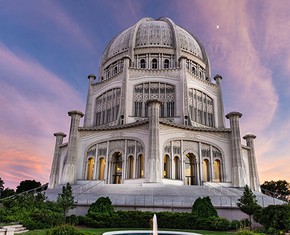The views expressed in our content reflect individual perspectives and do not represent the authoritative views of the Baha'i Faith.
My Facebook friend Ari and I had finally communicated enough that he stopped assuming he knew what I believed and, instead, asked what I believed or thought of a particular aspect of religion.
Among the things he asked about was the concept of a “personal God.” Did I believe in such a thing?
The definition of a personal God is one that, in my experience, varies from group to group and even believer to believer. Some religious groups take the view that God is literally a person in the same way that humans are persons — that He has a perfect corporeal body but is above nature in other ways. For others, the term means that God, whatever His form, is a Being capable of having a relationship with His creation — specifically, with the beings whom He created in His image.
RELATED: Is There a God Who Writes Our Stories?
So, depending on how you define “personal God” my answer would vary. Baha’u’llah teaches that God is not merely a physical being with a spiritual component, but rather that God is, as scripture tells us, Spirit — a different order of being not bound by the laws the Creator created, just as I am not bound by the laws of the worlds or the characters I create in my books.
There is agreement across many ages and dawning places of faith on the nature of God. Here are just a few of them:
God is one and alone, and none other existeth with Him. God is the One, the One who hath made all things. God is a spirit, a hidden spirit, the spirit of spirits, the great spirit of the Egyptians, the divine spirit …He hath been from the beginning, He hath existed from old and was when nothing else had being. … God is the eternal One … and aye — God is hidden and no man knoweth His form. … His name is a mystery unto His children. … God is Truth, He liveth by Truth, He feedeth thereon, He is the King of Truth, and He hath established the earth thereupon.
God is life, and through Him only, man liveth. He giveth life to man, He breatheth the breath of life into his nostrils. God is father and mother, the father of fathers and the mother of mothers. … God Himself is existence. He endureth without increase or diminution… God hath made the universe, and He hath created all that therein is. …What His heart conceived straightway came to pass. When He hath spoken it cometh to pass and endureth for ever. – Papyrus of Ani, Egyptian scripture
Who verily knows and who can here declare it, whence it was born and whence comes this creation? The gods are later than this world’s production. Who knows then whence it came first into being? He, the first origin of this creation, whether he formed it or did not form it, Whose eye controls this world in highest heaven, he verily knows it. – The Rig-Veda, Hindu scripture
But the highest spirit is another: it is called the Spirit Supreme. He is the God of Eternity who pervading all sustains all. – The Bhagavad Gita, Hindu scripture
Hear, O Israel: The Lord our God is one Lord: And thou shalt love the Lord thy God with all thine heart, and with all thy soul, and with all thy might. – The Torah, Jewish scripture
The Element (or Cause) is without beginning in time. It is the common foundation of all dharmas (truths). – The Ratnagotravibhaga, Buddhist scripture
God is spirit, and his worshipers must worship in spirit and in truth. – The Gospel of John, Christian scripture
God is the Creator of all things, and He is the Guardian and Disposer of all affairs. To Him belong the keys of the heavens and the earth: and those who reject the Signs of God, it is they who will be in loss. – The Qur’an, Surih 39, Islamic scripture
To every discerning and illuminated heart it is evident that God, the unknowable Essence, the Divine Being, is immensely exalted beyond every human attribute, such as corporeal existence, ascent and descent, egress and regress. Far be it from His glory that human tongue should adequately recount His praise, or that human heart comprehend His fathomless mystery. He is, and hath ever been, veiled in the ancient eternity of His Essence, and will remain in His Reality everlastingly hidden from the sight of men. – Baha’u’llah, Baha’i scripture
These represent just a tiny sampling of the scriptural references to the primal aspects of the Being a great many of us call God or Brahman or Allah or the Great Spirit. All agree on several points: God is a Being of a different order than we are; not corporeal but the essence of Spirit. That Spirit is eternal, and created the universe we inhabit. God is, as Baha’u’llah wrote, “the unknowable Essence” who wishes to be known.
RELATED: Mistaking Doctrine for Scripture, and Keeping an Open Mind
If corporeal existence is a requisite for a “personal God” then Baha’is don’t hold that belief. But Baha’u’llah, like those divine messengers who came before him, teaches the need for a relationship between the souls of human beings and the Spirit of God. Baha’u’llah often speaks of that relationship as the relationship between a lover and the Beloved — a deep, true, and eternal love.
Of course, any human conception of God is limited to what we humans can imagine. This means that everyone’s belief is unique … and inherently flawed. It is because God wishes to be known that prophets like Krishna, Christ, Baha’u’llah and others come into our world to aid in our understanding of life, the universe, and everything.
I suppose you could say that to Baha’is, they are letters from the One Beloved.
















Comments
Sign in or create an account
Continue with Googleor